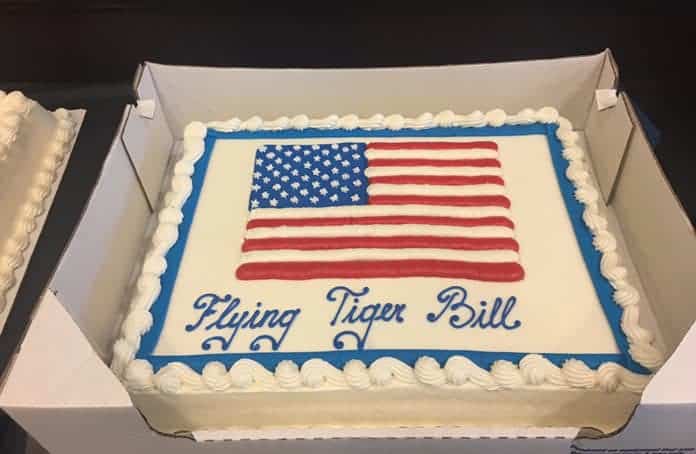
WHITING – It’s not every day a tiger turns 106 – a Flying Tiger that is.
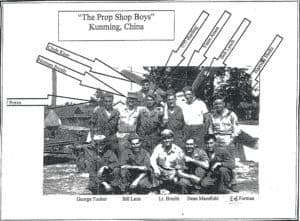
A sunny room at Aristacare at Whiting where Bill Laun lives was packed with his friends from the community who came out to celebrate the milestone, as well as two service members from Fort Dix and fellow veterans from Whiting VFW Post #8745. Marcy Viano, who works at Aristacare, said around 90 people were expected to show up to his June 4 birthday party, and a separate BBQ just for residents would be thrown at a later date.
“Everybody has a day in the sun – this is his day,” said Viano.
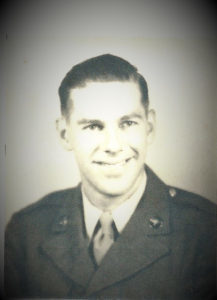
Flying Tigers is a nickname for what was borne out of the 1st American Volunteer Group of the Chinese Air Force during World War II, made up of fighter pilots from the U.S. Army Air Corps, Navy and Marine Corps, and commanded by Claire Lee Chennault, a retired U.S. Air Corps officer who had worked in China since 1937.
These Flying Tiger planes, which were used in aerial clashes against the Japanese, were one of the most recognizable combat aircrafts of their time because their noses were carefully painted to look like a shark’s mouth and face.
Although he didn’t fly the planes, Laun was in the “prop shop” and part of the 69th Depot Repair Squadron (DRS), a group of 350 men that provided repair and maintenance for the 14th Air Force of the U.S. Army Air Corps at a 3-mile base in Kunming, China. These unsung heroes – which included auto mechanics, welders, engine repairmen, supply officers and parachute specialists – were tasked with supplying the air support necessary to keep the planes running.
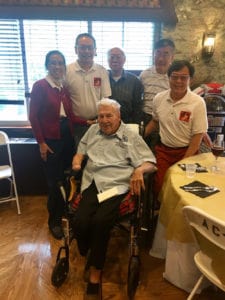
“He can tell you anything about a prop you want to know,” said Charlene Fontaine,” Executive Director of the Flying Tigers 69th DRS Association. She said Laun was part of the crew that drove 1,800 miles on Burma Road, through narrow roads, hairpin turns and steep drop-offs, to bring supplies to the base in Kunming. Out of the 350 men in the squadron, there are only 13 she is aware of who are still alive today.
“Flying Tigers are part of the 14th Air Force. I was a propeller specialist. I kept them flying. We stopped the Japs from coming into India. If they got into India, we would have probably lost the war,” said Laun.
The shark-faced planes played an important role in keeping Burma Road open for transporting supplies during the war, and also supporting the 14th Air Force’s mission of driving the Japanese out of China. If not for their efforts, China, and perhaps the whole planet, might be a different place today.
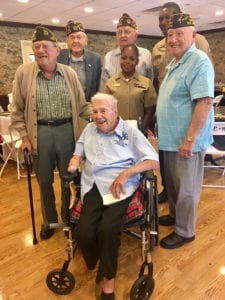
Laun’s birthday party also held a surprise visit from children of some of the Chinese men the Flying Tigers saved, who traveled all the way from Washington D.C., Pennsylvania and Virginia to honor the veteran and show their appreciation for his role in protecting their country during the war. They showed a video of the last Flying Tigers reunion held in Philadelphia in 2013. Laun was the oldest Flying Tiger at that reunion, celebrating his 102nd birthday. The youngest member at that time was 91.
Laun was completely surprised by the visitors, who came bearing two gifts: a banner written by a famous Chinese scholar that translates in English to “been there, done that, seen it all,” and a crystal plaque that reads “Flying Tiger Bill Laun – Our Hero, Thank You.”
“The reason we are here is because 70-some years ago you guys went there for our parents and our country and you are not forgotten,” said Bruce Yen.
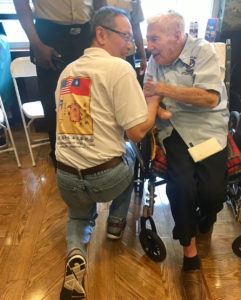
Laun’s cousin, Claudia Celmer, said that Bill has always loved planes, even when he wasn’t inspecting them, as well as collecting little model trains. He also loves holidays and entertaining. She said when she was helping him clean out his house to move, they found all kinds of frozen hors d’oeuvres ready to go in case company stopped by.
“I always say anybody that meets Bill, falls in love with him. He has that kind of personality,” said Celmer.
While working for a printing company after the war, he lost his right arm, but she said even that never slowed him down. He loves gardening and has two tomato plants out back that Celmer brought him, which he tends to.
Fontaine, whose father was also a Flying Tiger in the 69th DRS, recalled Laun’s love of woodworking, and said he made clocks and furniture from scratch. Although he did not have children of his own, she said he “adopted” many, such as herself, along the way. “He was one of those sweet guys that you wanted to stay close to and hug.”
At his birthday party, he was hoping to drink German white wine, but settled for some red, which he enjoyed with his birthday cake.






